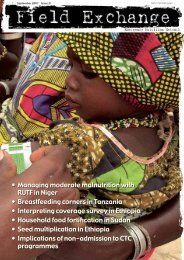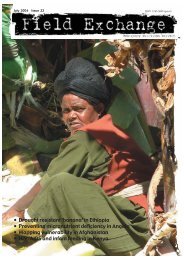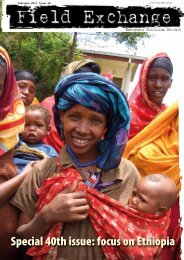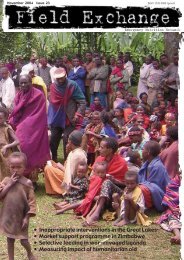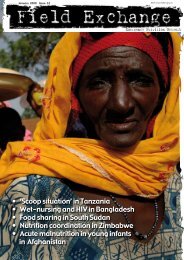Download PDF - Field Exchange - Emergency Nutrition Network
Download PDF - Field Exchange - Emergency Nutrition Network
Download PDF - Field Exchange - Emergency Nutrition Network
- No tags were found...
Create successful ePaper yourself
Turn your PDF publications into a flip-book with our unique Google optimized e-Paper software.
Letters<br />
Breastfeeding:<br />
Practice and<br />
Policy Course<br />
2005<br />
Acourse on ‘Breastfeeding: Practice<br />
and Policy Course 2005. Capacity<br />
Building on Infant and Young Child<br />
Feeding’ is to be held between the 13th<br />
June - 8th July 2005 at the Centre for<br />
International Child Health (CICH), Insitute<br />
of Child Health and Great Ormond Street<br />
Hospital for Children, University College<br />
London (UCL). The course will be held in<br />
collaboration with the World Health<br />
Organisation (Department of Adolescent<br />
and Child Health) and UNICEF (<strong>Nutrition</strong><br />
Section).<br />
The course is now also available as 2<br />
separate two week modules.<br />
• Part 1. Breastfeeding and Public<br />
Health: Essential Knowledge and<br />
Skills 13th - 24th June.<br />
• Part 2. Breastfeeding and Beyond:<br />
Addressing Challenges to Optimal<br />
Infant and Young Child Feeding. 27th<br />
June - 8th July.<br />
Courses can be taken as Certificate<br />
Courses, or to earn MSc/ Diploma credits<br />
under CICHs 'Taster Programme'. For<br />
more information contact: The<br />
Breastfeeding Course, Centre for<br />
International Child Health, Institute of<br />
Child Health, 30 Guilford St, London WC1<br />
1EH. Fax+44 171 404 2062 email -<br />
bfeed@ich.ucl.ac.uk. or visit<br />
www.cich.ich.ucl.ac.uk/cich under teaching<br />
programme.<br />
Carol Williams: Course Director<br />
Breastfeeding: Practice and Policy Course<br />
Centre for International Child Health<br />
Institute of Child Health, 30 Guilford St,<br />
London, WC1N 1EH<br />
Tel : 44 (0)20 7905 2122<br />
Fax: 44 (0)20 7404 2062<br />
email : bfeed@ich.ucl.ac.uk<br />
Breastfeeding course web pages:<br />
www.ich.ucl.ac.uk/cich under Teaching<br />
Programme<br />
Direct address:<br />
carol@carowill.freewire.co.uk, or<br />
cwilliams@ich.ucl.ac.uk<br />
<strong>Emergency</strong><br />
<strong>Nutrition</strong><br />
Assessment<br />
Guidelines for<br />
field workers<br />
SC UK have just produced a<br />
new publication entitled<br />
‘<strong>Emergency</strong> <strong>Nutrition</strong><br />
Assessment – Guidelines for field<br />
workers’. These guidelines offer<br />
straightforward, step-by-step guidance<br />
on how to carry out a nutrition<br />
assessment.<br />
<strong>Emergency</strong> <strong>Nutrition</strong><br />
Assessment starts by looking at<br />
how to assess potential causes of<br />
malnutrition in emergencies. This is<br />
followed by practical guidance on<br />
how to conduct field surveys on the<br />
prevalence of malnutrition and the<br />
rate of mortality among under-fives;<br />
and how to interpret the findings<br />
and present your recommendations.<br />
A separate section looks at how to<br />
measure feeding programme coverage.<br />
Software tools for use in designing<br />
and analysing findings are<br />
included on an accompanying CD-<br />
Rom, which also contains key supporting<br />
texts on nutrition assessment.<br />
(<strong>Emergency</strong> <strong>Nutrition</strong> Assessment<br />
is available for sale from NBN<br />
International Tel: 01752 202301,<br />
email orders@nbninternational.com<br />
or go to<br />
www.savethechildren.org.uk/<br />
publications )<br />
Catastrophes & Conflict Forum<br />
Ameeting will be held on ‘Famine’ as part of the Catastrophes & Conflict<br />
Forum at the Royal Society of Medicine in London. The date for the event<br />
is the 15th June at 6.00 pm. Topics will include 'Malnutrition, media and<br />
myths', 'Beyond the feeding centre' and 'Issues in food aid'. Book on-line at<br />
http://www.rsm.ac.uk/catastrophes or contact Lulu Ho<br />
mailto:catastrophes@rsm.ac.uk tel +44 (0)20 7290 2987, fax +44 (0)20 7290 2989<br />
Nomenclature used in programs for tackling<br />
malnutrition<br />
Dear Editor,<br />
The following terms, inter alia, have been<br />
used in describing programs/centres.<br />
CTC Community Therapeutic Care<br />
TFC Therapeutic Feeding Centre<br />
TFP Therapeutic Feeding Program<br />
NRU <strong>Nutrition</strong> rehabilitation unit<br />
NRC <strong>Nutrition</strong> rehabilitation centre<br />
SNU Special <strong>Nutrition</strong> Unit<br />
HT Home treatment (of severe malnutrition)<br />
OPT Out-Patient Therapy (for severe mal<br />
nutrition)<br />
AC Ambulatory care (for severe malnutrition)<br />
SC Stabilisation centre<br />
P1C Phase 1 centre<br />
DCC Day care centre<br />
RDCC Residential Day care centre<br />
SFC Supplementary Feeding Centre<br />
SFP Supplementary Feeding Programe<br />
The fact that there is such a myriad of<br />
terms poses difficulties.<br />
1) It is very confusing especially for those<br />
not actively involved in the field.<br />
2) Many of the terms are being used<br />
incorrectly (not in the way the originator<br />
of the terms intended). For example<br />
CTC is frequently used as a synonym<br />
for out patient/home treatment of<br />
severe malnutrition.<br />
3) Many of the terms are in fact descriptors<br />
for the same, or nearly the same,<br />
activity. They have been given different<br />
names by different organisations. To<br />
many readers this leads to the impression<br />
that the activity is different or new<br />
when in fact this is a minor “variation<br />
on a theme”.<br />
Community Therapeutic Care.<br />
CTC, according to Collins.S (the originator<br />
of the term) – is a holistic concept of an integrated<br />
program that includes many other elements.<br />
Indeed almost every activity that<br />
leads to a good “<strong>Nutrition</strong> Program” seems<br />
to be included under this rubric. Thus, it<br />
includes a minimum of:<br />
1) residential care for selected severely<br />
malnourished,<br />
2) outpatient management of eligible children<br />
with severe malnutrition,<br />
3) supplementary feeding program,<br />
4) active case finding/community screen<br />
ing,<br />
5) active community involvement, mobilisation,<br />
etc.. However it also includes,<br />
among others,<br />
6) integration with existing food security<br />
programs, demonstration gardens,<br />
diversification of local crops,<br />
7) local manufacture of therapeutic products<br />
(RUTF),<br />
8) mother-to-mother and Hearth type programs,<br />
9) integration with local public health<br />
programs.<br />
The term knows no bounds: it is a utopian<br />
all-encompassing program that includes<br />
everything that may impact upon the nutritional<br />
status of the population. Indeed, the<br />
inclusion of “therapeutic” in this context is<br />
confusing and inappropriate – what Collins<br />
describes is a “Holistic <strong>Nutrition</strong><br />
Program”. Many use the term CTC and home<br />
(cont’d. over)<br />
15



